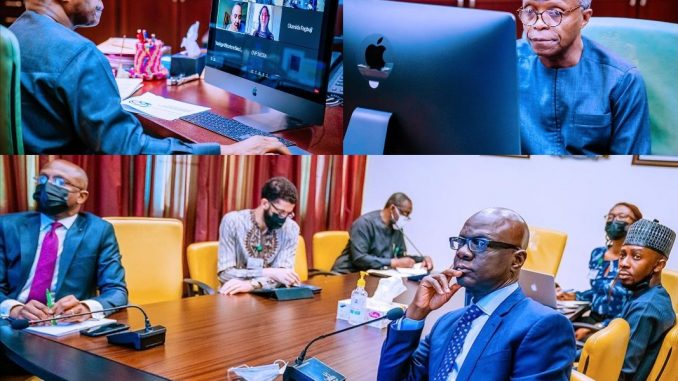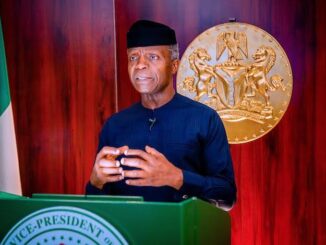
Vice President Yemi Osinbajo has said that the attainment of Universal Health Coverage (UHC) for all Nigerians is at the heart of the human capital development of Federal Government.
He gave the assurance on the second day of the “Fourth Annual Legislative Summit on Health” with the theme “Universal Health Coverage and Health Security (HS): Two Sides of a Coin for an Efficient Health System” on Monday in Abuja.
The News Agency of Nigeria (NAN) reports that the summit holds from May 23 to 25, convened by the National Assembly with support from partners.
Represented by the Minister of State for Health, Sen. Olorunnimbe Mamora, the vice president said that “the theme of the summit clearly suggests that there is connection between UHC and health security.
“I believe that at the end of this summit, that link will even be made clearer.
“Our experience in the last one year of COVID-19 in Nigeria has exposed the vulnerability of our health system and the importance of preparedness, diagnosis and response mechanism. However, there are different understanding of what is meant by the concept of health Security.
“According to the World health Organisation, global public health security is defined as activities required, both proactive and active, to minimise the danger and impact of acute public health events that endanger people’s health across geographical regions and international boundaries.”
He stated that one of such proactive steps was to ensure that funds were set aside for public health emergency.
“Such fund should only be utilised when a public health emergency is declared, while the legislature must ensure that adequate budgetary allocation was made for preparedness activities.
“Reactive and response activities must also include ensuring the continuity of routine services such as immunisation and family planning, as well as keeping diseases like malaria in check.”
ALSO READ: VP Osinbajo’s wife among early sympathizers at late COAS Attahiru’s official residence
The vice president said Federal Ministry of Health (FMoH) was committed to the achievement of UHC for all citizens through the Basic Health Care Provision Fund (BHCPF), which had been revised to provide a richer basic minimum package of health services to meet common healthcare needs of citizens.
According to him, the fund will help the poor and vulnerable to access essential health services without experiencing catastrophic out of-pocket expenditure that often spells financial ruin to the average citizen.
He, however, urged the summit participants to critically look at the issues and come up with recommendations that would complement ongoing efforts toward strengthening the health system in the country.
The President of the Senate, Sen. Ahmed Lawan, said the past months had been challenging as regards the COVID-19 pandemic.
Lawal, who was represented by Sen. Aliyu Sabi Abdullahi, the Deputy Chief Whip, said that credit must be given to the frontline workers who worked to combat the pandemic.
Dr Alexander Gomez, the Deputy Head of Delegation, European Union to Nigeria, said increased allocation and the efficiency of the appropriation of the expenditure for health was an important factor that must be considered in the country.
On his part, the Minister of State for Health, Olorunnimbe Mamora, noted that all through the summit, participants
should continue to remind themselves about the principles of UHC in terms of availability, accessibility and affordability of healthcare.
The minister added that UHC and Health Security compliment each other to achieve same goal.
He noted that “the 3As of UHC are Availability of care, Accessibility of care and Affordability to all, particularly the vulnerable
groups, namely the elderly, those with disabilities, women and children, without hardship.
“To make UHC a reality, there is need for partnership, collaboration and synergy at both horizontal and vertical levels between the executive and the legislature,” he explained.
According to him, the legislature must put in place key legislations and particularly better funding through appropriations and must follow up with good oversight to ensure effective and efficient implementation.
Mamora added that government’s partnership with the private sector and development partners was key, saying that
the BHCPF was a step in the right direction.




